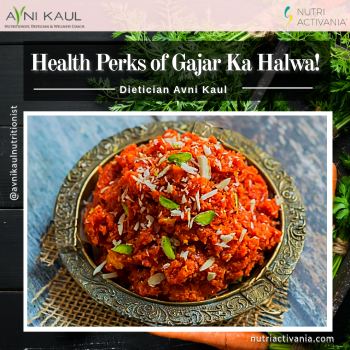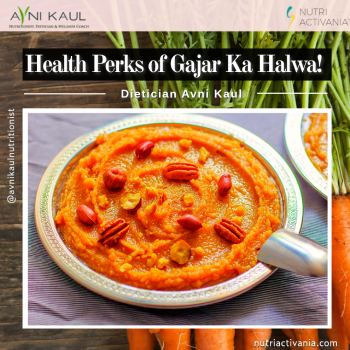
What is an Indian winter without a comforting bowl of gajar (carrot) ka halwa? Whether you have just returned from school or had a tough day at work, this warm and sweet winter treat, made from carrots, milk, sugar, and ghee with a hint of cardamom, is sure to take away all your worries and keep you warm. It is undeniably a rich dish due to which some health-conscious individuals may prefer to steer clear of its delicious goodness.
Can this indulgent delight offer unexpected health perks that might just make it a guilt-free pleasure? Leading dietician in Delhi Avni Kaul delves deep into the dish to find out more.

Cooked carrots are better for you than raw ones because they contain a compound called Beta-Carotene, also known as carotenoids. These are absorbed more efficiently by the body when carrots are cooked. Beta-carotene is a fat-soluble vitamin, and the good news is that it doesn’t get lost during the cooking process, even at high temperatures.
When carrots are cooked, the cell walls in the plant tissues soften, which makes it easier for our digestive system to absorb Beta-Carotene. This compound is a provitamin, meaning our bodies can easily convert it into vitamin A. Vitamin A is essential for maintaining good vision, promoting healthy skin, and supporting the immune system. So, enjoying a dish like gajar ka halwa could be a tasty way to boost these vital nutrients. Vitamin C in carrots improves your immunity by protecting you against various diseases.
Gajar ka halwa, made from carrots, is not just a tasty treat; it is also good for your digestion. Carrots are rich in fiber, that help keep your digestive system healthy. It also helps control blood sugar and makes you feel full, which is excellent for weight management. So, enjoying this sweet dish can be a surprising way to support your overall health.
Adding milk to gajar ka halwa not only enhances its taste but also boosts its nutritional value. The calcium and Vitamin D in milk are great for strengthening bones. Vitamin D aids in absorbing calcium, crucial for bone health and preventing issues like osteoporosis and fractures, especially in women. Milk is also rich in protein and fatty acids, including heart-healthy omega-3s, making it beneficial for those with cardiac ailments and diabetes.
Ghee, a clarified form of butter, is added to Gajar Ka Halwa not just for its rich flavor but also for health benefits. Ayurveda suggests that ghee enhances memory, slows aging, and boosts immunity. It lubricates joints, easing aches, and provides warmth in cold weather. Despite being high in fat, ghee contains beneficial monounsaturated Omega-3s, supporting heart health. It also has conjugated linoleic acid (CLA), which is linked to reduced inflammation and weight management. When consumed in limited amounts, ghee adds an extra dose of health to this delicious winter delight.
Nuts used in gajar ka halwa contain monounsaturated and polyunsaturated fats, which are good for your heart. Almonds, cashews, and raisins are nutrient-packed with vitamins like E, and minerals like magnesium, and iron. Raisins, especially, add dietary fiber, aiding digestion. Antioxidants in almonds help neutralize free radicals for overall health. While dry fruits are calorie-rich for a quick energy boost, moderation is key in adding them to Gajar ka Halwa for a satisfying and energizing dessert.
Gajar ka halwa, though a quick energy source, can cause health issues like obesity, dental problems, and diabetes due to excessive sugar. However, you can make it healthier by replacing the white refined sugar with an unrefined natural sweetener, jaggery. Jaggery is rich in vitamins and minerals and contains less sucrose than sugar. Research suggests that jaggery is easier on the body, taking longer to digest and providing a slower release of energy, making it a better choice for diabetics.
Gajar ka Halwa isn’t just a delightful winter treat; it is a nutritional powerhouse. Cooked carrots offer a concentrated dose of Beta-Carotene for eye, skin, and immune health. The addition of milk, ghee, and dry fruits enhances its nutritional profile while swapping sugar for jaggery adds sweetness with fewer health concerns. Enjoy this indulgence guilt-free for a flavourful boost to overall well-being. If you have any health-related issues, consult a qualified dietician before including gajar ka halwa in your diet.
Avni Kaul is Founder of Nutriactivania with Masters Degree in Food and Nutrition from University of Delhi and is also a Certified Diabetes Educator from Project Hope and International Diabetes Federation. She is a Leicester Mammas Ambassador trained in Lactation Counselling with NHS United Kingdom. Mammas support pregnant and new mothers and their families. Specializations of Avni Kaul Include Infant and Young Child Feeding Practises, Pre and Post natal diets, Fat loss, Muscle Gain and Holistic Health and Nutrition